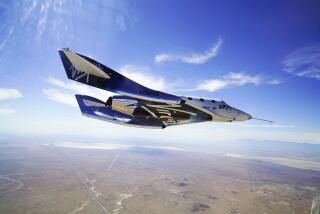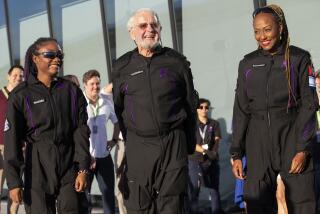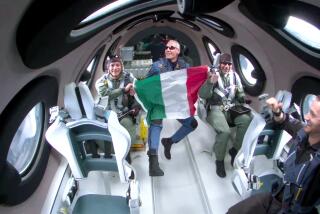Learning Curve : Virgin Airlines Took Off After Founder Studied Others’ Mistakes
- Share via
NEW YORK — When British entrepreneur Richard Branson started Virgin Atlantic Airlines four years ago, he wanted to call the seat categories on his planes Upper Class and Riff-Raff Class.
His associates talked him out of the latter classification, he recalls, because “they thought that Americans might not realize that I have a sense of humor.”
But the fledgling airline is no joke. It has become a financial success, and Branson, a 38-year-old rock music record tycoon, might soon follow his original instinct. He is once again considering the name Riff-Raff for what he calls the “boring” name of economy class.
Since its inauguration in 1984, Virgin Atlantic has flown its passengers--whatever their status in life--between London’s Gatwick Airport and Newark, N.J. Flights between London and Miami soon followed, as did a limited number of flights from Britain to other European countries.
The airline began its transatlantic flights with two leased Boeing 747s, which it has since purchased, and it still uses two leased Vickers Viscount 800s for the European flights. Now, Branson said in an interview, since his little airline is packing in the passengers, it is about to lease four more 747s. Service between London and Los Angeles is expected to begin next year, as are flights from London to Tokyo and to New York’s Kennedy airport.
The airline got its name from the Virgin Group, Branson’s leisure and entertainment conglomerate, with businesses ranging from travel and publishing to records and video. He chose the name when he went into business as a teen-ager, he said, because “I thought it was an appropriate name for someone inexperienced in business.”
Virgin Group’s shares were first sold to the public and began trading in November, 1986. Now, however, Branson and a group of other managers are buying up the outstanding shares and taking the company private once more. The transaction is expected to be completed in January.
There have been problems because Virgin Atlantic has so few planes: Flights have been delayed and even canceled when mechanical or other difficulties occurred. But Branson said that of the six 747s he expects the airline to be operating next year, one will be used exclusively as a backup for just such eventualities.
Success did not come to the fledgling carrier overnight.
At the outset, Virgin Atlantic had an image problem, according to Branson, a self-made millionaire who started his first business at 15. Because it frequently offers entertainment on its transatlantic runs and because its owner is one of the largest record producers in the world--with a roster of rock and pop stars that includes Phil Collins, Boy George and about 200 others and once included the Sex Pistols--Virgin Atlantic quickly acquired the reputation of being a rock ‘n’ roll airline.
And, because of its discount fares, travelers associated Virgin Atlantic with Britain’s Laker Airways, which went bankrupt in 1982, and with People Express, which also no longer exists. Both those carriers were deep discounters that offered no creature comforts.
“In the second week that we were in business,” the bearded Branson recalled as he lounged shoeless, his feet on a couch in a hotel suite here the other day, “I flew to New York and I had the entire Upper Class cabin to myself. To anyone else, that is comfortable. But if you own the airline, it’s pretty uncomfortable.”
Branson said Virgin Atlantic quickly sought the patronage of business travelers by offering to “pamper” them. “We wanted to be a frills-filled airline,” he said.
Despite its discount fares, the airline offers first-class amenities in its business class (the so-called Upper Class): sleeper seats, a lounge and a stand-up bar. Upper Class passengers are picked up at their homes by limousines. Soon there will be small television sets--equipped to receive satellite transmissions--for each Upper Class passenger.
Although the airline says its front cabin offers first-class service, it does not use that term because, Branson said, most corporations will not allow employees to fly first class anymore.
Another popular attraction designed to lure business travelers is actually a form of discounting. It is Virgin Atlantic’s “Infrequent Flier Program,” in which Upper Class travelers, as they board the plane, are handed a free economy-class standby ticket for later use.
Now, Branson said, the front cabin is so popular that it frequently takes several days to get a confirmed reservation. The number of seats in economy class, which is also patronized by many people on business trips, has been reduced to 223 so that the Upper Class cabin can hold 74. More than half of all of the airline’s passengers are now business travelers.
Virgin Atlantic planes, Branson said, flew with loads averaging 85% on the Miami route and 77% between Newark and London in the fiscal year that ended July 31. That compares to an average for all transatlantic carriers in the mid-60% range. In the busy summer months, he said, the airline’s load factors were consistently 100%.
“The income from business people is fantastic,” he said. “That is where most of our profits come from.”
Cargo is also an important source of revenue and profit for the airline, accounting for about a third of each, Branson said.
In the 1987 fiscal year, which ended July 31, profit totaled $20.8 million, Branson said, and, despite start-up costs for the new routes, he predicted a profit of $29.5 million in the current fiscal year.
For its on-board entertainment, the airline trades free tickets for performances. The entertainers are chosen by patrons of a nightclub that Branson owns in London, and he conducts talent contests there. Thumbs up by the audience, and the entertainers can pack their bags. Thumbs down, and they stay home or pay for a ticket. The artists--they range from rock groups and cellists to mimes--perform for 15 minutes in each cabin on each flight. Passengers can expect entertainment once or twice a week.
But Virgin Atlantic plans to go slow. Having seen the mistakes of others, Branson said, it will stay small, with plans to fly to no more than 10 major cities from London. And there will not be more than one flight daily to any of these destinations.
Learning From Mistakes
Branson does not want to make the same errors others did and said he believes that the downfall of the flamboyant Sir Freddie Laker came because he tried to make his airline grow too fast.
The publicity-shy Branson, who kept out of the limelight until he founded the airline, is one of the richest men in Britain; he says he is worth $520 million. And, even though he runs 120 companies in 23 countries and even though a recent straw poll of British young people voted him third most popular next to Prince Charles and Pope John Paul II, he is not ashamed to try to learn from another’s mistakes. After all, Laker was something of a national hero one day but ran out of money to pay the leases on his planes the next.
Branson took Laker out to lunch for a brain-picking session before Virgin Atlantic began to fly. “It is easier to follow a pioneer than to be a pioneer,” said Branson, who operates his business empire, which employs 5,000 people, from a barge moored on London’s Thames River.
“We have all made mistakes in life,” he said, “but I think the best person from whom to learn about mistakes is the person who made them. Learning from the mistakes of others is cheaper than learning from your own.”
As a token of his esteem and appreciation, Branson even wanted to name one of his planes “The Spirit of Sir Freddie.”
But Laker felt that such a move might jinx Virgin Atlantic. Sir Freddie, Branson recalled, felt that Laker Airlines was a failure and being associated with failures is not necessarily a good idea for a new airline.
VIRGIN ATLANTIC AT A GLANCE
Maiden flight: June 22, 1984. Employees: 700 worldwide, with another 300 next year as new routes are added. Airline employs 250 in the United States. Number of planes: The airline owns two Boeing 747s and plans to lease four others for its new transatlantic routes to begin next year. It also leases two Vickers Viscount 800s for its European routes. Current routes: London (Gatwick) to Newark, N.J.; London (Gatwick) to Miami; London (Gatwick) to Maastricht, Holland; Luton, England, to Dublin, Ireland. Accommodations: Virgin Atlantic’s 747s can carry 74 passengers in “Upper Class,” 223 in economy. Number of transatlantic flights: London to Newark, eight flights a week in summer, daily in winter. London to Miami: five flights a week in summer, three a week in winter. Passengers carried: 556,653 in fiscal year ended July 31, 1988, up from 402,105 in fiscal 1987. Average system load factors: London to Newark, 77%; London to Miami, 85%. New routes planned: London to Tokyo, May 1, 1989; London to Los Angeles, June 1, 1989; London to New York (Kennedy), July 1, 1989 (starting dates tentative).
More to Read
Inside the business of entertainment
The Wide Shot brings you news, analysis and insights on everything from streaming wars to production — and what it all means for the future.
You may occasionally receive promotional content from the Los Angeles Times.










